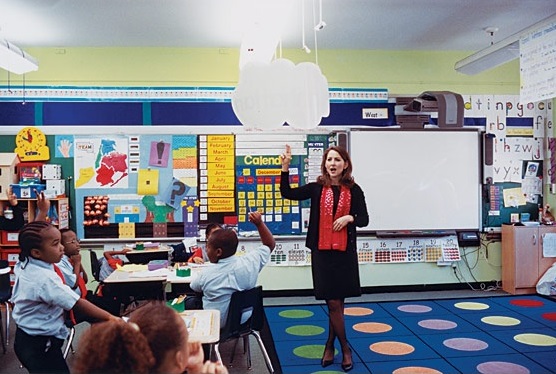In 2013, on the [New York] state exams that gauge proficiency in math and English, Success Academy schools far outscored not only the city’s regular public schools but also its most highly regarded charters, networks like Achievement First, KIPP (the Knowledge Is Power Program) and Uncommon Schools. At one of [Eva] Moskowitz’s Harlem academies, the fifth graders surpassed all other public schools in the state in math, even their counterparts in the whitest and richest suburbs, Scarsdale and Briarcliff Manor...It might seem as if any New York mayor would be thrilled to have thousands of the city’s most underprivileged children educated so well. But during Bill de Blasio’s campaign last year and then as he claimed City Hall, he and Moskowitz took each other on in a ferocious political battle...For many critics, performance is almost beside the point. To [Diane] Ravitch [New York University professor and education historian], the [charter school] movement itself is destructive; “it undermines the public’s commitment to public education.”...What these philanthropists are all about, Ravitch says, is making themselves feel good while using charters as a halfway step in a covert effort to pull the country toward the privatization of education.
A terrific New York Times article on the battle between New York City mayor Bill de Blasio and charter school network leader Eva Moskowitz.
The data-driven accountability approach (read: a lot classroom testing) that charter schools emphasize removes the glossy image around child learning and development. And the growth of charter schools, that use public funds but operate under private authority, competes with the attractive national commitment to mandatory public education. However, that image of promising universal opportunities was actually tainted ages ago when it became clear that public schools were often not successfully educating the country's poor children. The fact that this network of charter schools is able to overturn the giant table of privilege and poverty is evidence of the inexcusable necessity of reform.
Learning is complicated and school reform is hard to do. And my experience has mostly been through my advisor, who mines global nooks and crannies for the specific things that improve learning in poor countries (which is enormously different from the US context). In other words, I am playing outside my sandbox here. But if a school or charter network is actually improving learning outcomes and closing educational disparities, I think its worth putting Ravich's (and de Blasio's) issue with the principle of charter schools aside. These schools do privatize education to some degree (and certainly introduce competition), but failing to reform for the sake of a national vision is at the expense of too many children. If this network of charter schools is actually working, I say: don't fix it, de Blasio.
In other news, Maskowitz's advocacy group, Families for Excellent Schools, sounds about as mysterious and ominous as a Koch brothers' super-PAC.
A terrific New York Times article on the battle between New York City mayor Bill de Blasio and charter school network leader Eva Moskowitz.
The data-driven accountability approach (read: a lot classroom testing) that charter schools emphasize removes the glossy image around child learning and development. And the growth of charter schools, that use public funds but operate under private authority, competes with the attractive national commitment to mandatory public education. However, that image of promising universal opportunities was actually tainted ages ago when it became clear that public schools were often not successfully educating the country's poor children. The fact that this network of charter schools is able to overturn the giant table of privilege and poverty is evidence of the inexcusable necessity of reform.
Learning is complicated and school reform is hard to do. And my experience has mostly been through my advisor, who mines global nooks and crannies for the specific things that improve learning in poor countries (which is enormously different from the US context). In other words, I am playing outside my sandbox here. But if a school or charter network is actually improving learning outcomes and closing educational disparities, I think its worth putting Ravich's (and de Blasio's) issue with the principle of charter schools aside. These schools do privatize education to some degree (and certainly introduce competition), but failing to reform for the sake of a national vision is at the expense of too many children. If this network of charter schools is actually working, I say: don't fix it, de Blasio.
In other news, Maskowitz's advocacy group, Families for Excellent Schools, sounds about as mysterious and ominous as a Koch brothers' super-PAC.


 RSS Feed
RSS Feed